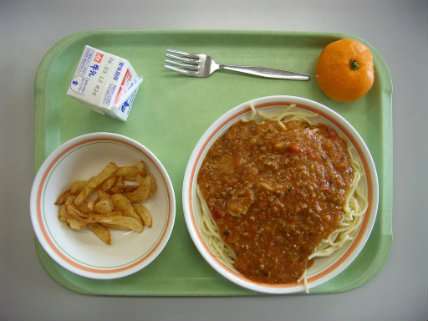This Is What Happens When the Federal Government Plays National Lunch Lady

I'd like to state up front that I fully support First Lady Michelle Obama's assertion that school cafeterias should be serving less refined carbohydrates and more fruits and vegetables. I'd just like to leave it up to individual states, cities, or school districts to work out the specifics. When you have the federal government dictating the precise percentage of whole grain flour that must be used in school cafeteria carbs, you wind up with the ridiculous, time-wasting "food fight"* that's been taking place in the U.S. House this week.
To sum up the silliness (which I blogged about in more detail here): New rules for school lunch programs that take federal funding require cafeterias to offer more whole grains, more fruits and vegetables, and less sodium-heavy options. A provision tacked onto the agriculture appropriations bill by House Republicans would allow schools having trouble meeting these requirements to seek a temporary one-year waiver. That's it.
The House Appropriations Committee passed the budget bill, including the school nutrition program waiver, on Thursday, by a vote of 31 to 18. "Everyone supports healthy meals for children," Rep. Robert Aderholt (R-Ala.), chairman of the House appropriations agriculture subcommittee, told The New York Times. "The bottom line is that schools are finding it's too much, too quick."
The response from Mrs. Obama and her supporters has been unequivocal. On Tuesday, the first lady called the waiver "unacceptable" and an example of Republicans "playing politics" with kids' health. Rep. Sam Farr (D-Calif.) called the waiver a "poison pill."
It all smacks of unbelievable arrogance. It's one thing for Michelle Obama to promote more nutritious cafeteria fare, help develop best practices that schools could follow, and work closely with school districts to implement these practices. Those are all incredibly worthwhile projects.
But setting highly specific and ironclad rules for schools across the country crosses the line. Why should D.C. dietitians, politicians, and bureaucrats know better than lunch program administrators themselves what's feasible in their school districts, and in what time frame? Congressional leaders are now wasting time and energy fighting over things that would really be best hashed out on a local level. We just don't need the centralized planning of our cafeteria trays.
* Seemingly one out of every two journalists covering this issue can't resist using that pun in headlines.


Show Comments (106)